BEIJING, Dec. 30 (Xinhua) -- The following are the top 10 world news events in the year of 2021 selected by Xinhua in a chronological order:
Capitol riot breaks fantasy of "American-style democracy"
On Jan. 6, supporters of then U.S. President Donald Trump stormed the Capitol building in Washington, D.C. and clashed with police, leaving five people dead and many others injured. The riot against an orderly transition of presidential power is seen as one of the most far-reaching domestic extreme events in U.S. history.
Bloodshed and violence at the landmark of American politics stunned the world, exposing huge social disparities and breaking the fantasy of the "American-style democracy," which has long been used as an instrument by U.S. politicians to manipulate public opinion and maximize their own interests.
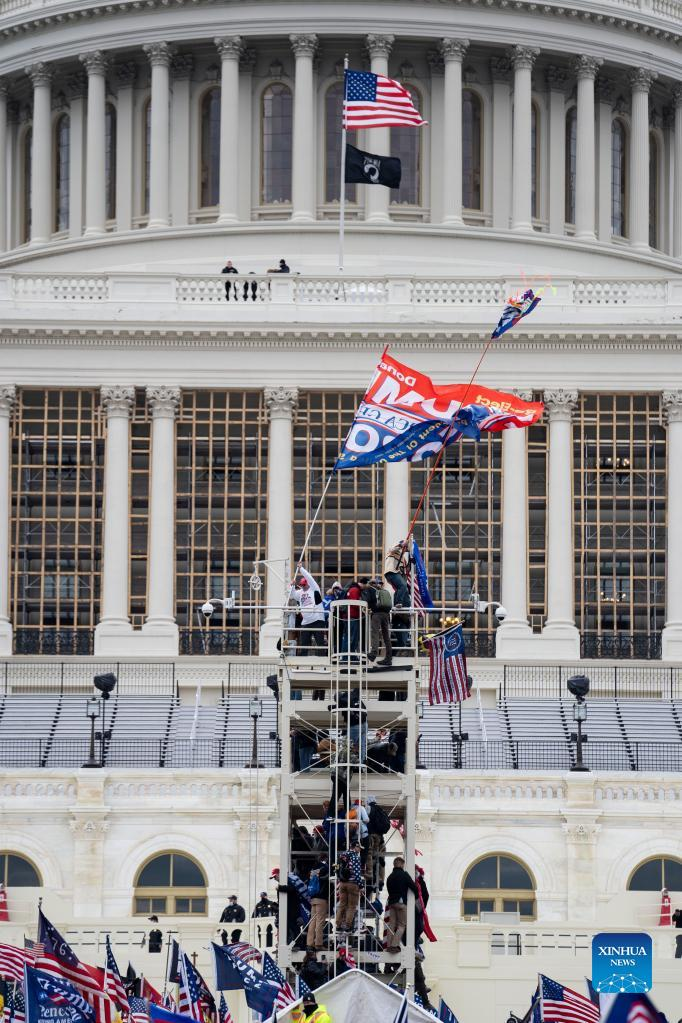
Supporters of Donald Trump gather in front of the U.S. Capitol building in Washington, D.C., the United States, Jan. 6, 2021. Xinhua's top 10 world news events in 2021 Capitol riot breaks fantasy of "American-style democracy" On Jan. 6, supporters of then U.S. President Donald Trump stormed the Capitol building in Washington, D.C. and clashed with police, leaving five people dead and many others injured. The riot against an orderly transition of presidential power is seen as one of the most far-reaching domestic extreme events in U.S. history. Bloodshed and violence at the landmark of American politics stunned the world, exposing huge social disparities and breaking the fantasy of the "American-style democracy," which has long been used as an instrument by U.S. politicians to manipulate public opinion and maximize their own interests. (Xinhua/Liu Jie)
Suez Canal blockage exposes fragility of world economy
On March 23, a large container ship ran aground at the Suez Canal and blocked the waterway. The flow of about 12 percent of world trade volume came to a halt.
The fragility of the world economy was exposed this year. Bottlenecks on logistics and soaring freight rates disrupted global supply chains, and industrial chains were hit by chip shortages and rising commodity prices. Heavier debt, combined with an influx of liquidity, exacerbated the volatility of financial markets. The economic recovery from the COVID-19 pandemic was unbalanced. The gap between the rich and the poor widened, and so did the huge development gap.
In the face of the profound impacts of COVID-19 and headwinds in economic globalization, all countries should step up macro policy coordination with major economies shouldering greater responsibility for better global economic governance.
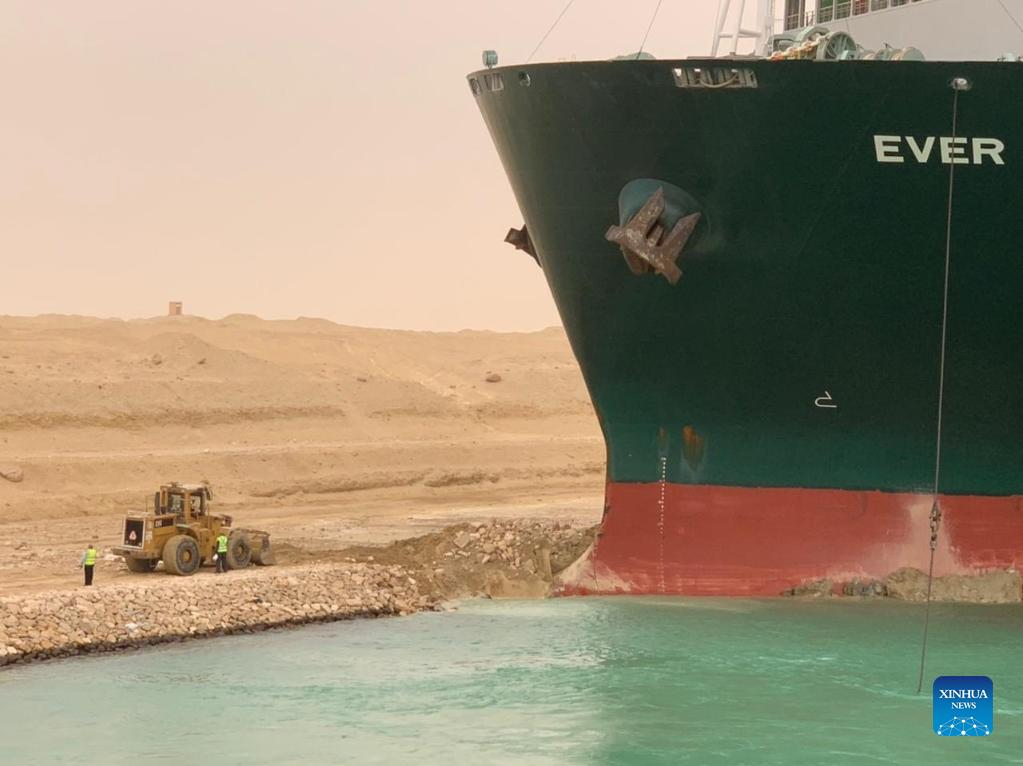
Photo taken on March 24, 2021 shows the giant cargo container trapped on the Suez Canal of Egypt. Xinhua's top 10 world news events in 2021 Suez Canal blockage exposes fragility of world economy On March 23, a large container ship ran aground at the Suez Canal and blocked the waterway. The flow of about 12 percent of world trade volume came to a halt. The fragility of the world economy was exposed this year. Bottlenecks on logistics and soaring freight rates disrupted global supply chains, and industrial chains were hit by chip shortages and rising commodity prices. Heavier debt, combined with an influx of liquidity, exacerbated the volatility of financial markets. The economic recovery from the COVID-19 pandemic was unbalanced. The gap between the rich and the poor widened, and so did the huge development gap. In the face of the profound impacts of COVID-19 and headwinds in economic globalization, all countries should step up macro policy coordination with major economies shouldering greater responsibility for better global economic governance. (Xinhua)
World again keen on space exploration
On May 15, China's probe Tianwen-1 touched down on Mars, marking a pivotal step in China's space exploration. Earlier in February, the Hope Probe of the United Arab Emirates and NASA's Perseverance rover entered the orbit of the red planet. The three visitors set off a new upsurge of Mars research.
In April, China sent into space the core module Tianhe of its space station, kicking off a series of key launch missions to complete the station's construction. In June and October, two batches of Chinese taikonauts went onboard the space station. In December, NASA's James Webb Space Telescope lifted off into orbit.
Commercial spaceflights have also taken a leap forward this year. In September, four tourists were launched into space for a journey. A Russian actor and a film director returned to Earth in October after filming a science fiction movie at the International Space Station.
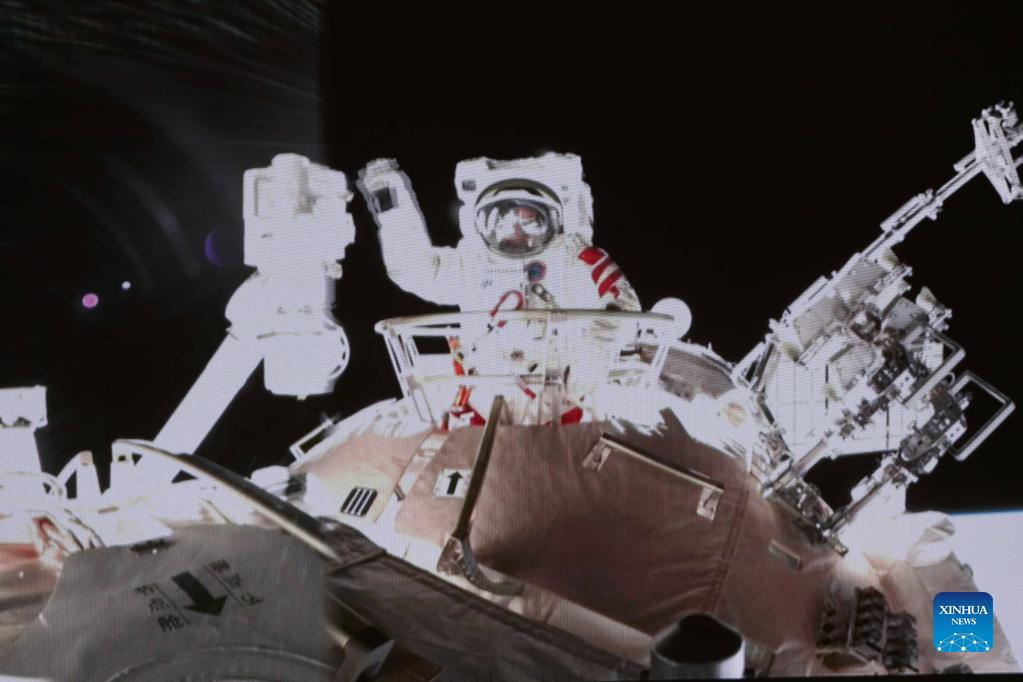
Screen image taken at Beijing Aerospace Control Center on Nov. 8, 2021 shows Chinese taikonaut Zhai Zhigang waving his hand after completing extravehicular activities. Xinhua's top 10 world news events in 2021 World again keen on space exploration On May 15, China's probe Tianwen-1 touched down on Mars, marking a pivotal step in China's space exploration. Earlier in February, the Hope Probe of the United Arab Emirates and NASA's Perseverance rover entered the orbit of the red planet. The three visitors set off a new upsurge of Mars research. In April, China sent into space the core module Tianhe of its space station, kicking off a series of key launch missions to complete the station's construction. In June and October, two batches of Chinese taikonauts went onboard the space station. In December, NASA's James Webb Space Telescope lifted off into orbit. Commercial spaceflights have also taken a leap forward this year. In September, four tourists were launched into space for a journey. A Russian actor and a film director returned to Earth in October after filming a science fiction movie at the International Space Station. (Photo by Guo Zhongzheng/Xinhua)
U.S. withdrawal from Afghanistan a big fiasco, leaving disasters behind
On Aug. 30, U.S. troops were completely pulled out of Afghanistan. The 20-year war Washington unilaterally launched ended in a big fiasco. The hasty withdrawal, regardless of U.S. allies, led to turmoil on Afghan soil. Meanwhile, brutal airstrikes brought many civilians, including children, to death. America once again demonstrated its selfish and high-handed nature.
The longest war in U.S. history claimed more than 30,000 lives of Afghan civilians, and turned about 11 million people into refugees. Long-term wars and conflicts took a heavy toll on people's livelihood, as three-quarters of the population in Afghanistan lived below the poverty line. The U.S. forces fled irresponsibly, leaving behind them enduring pains and disasters for Afghans.
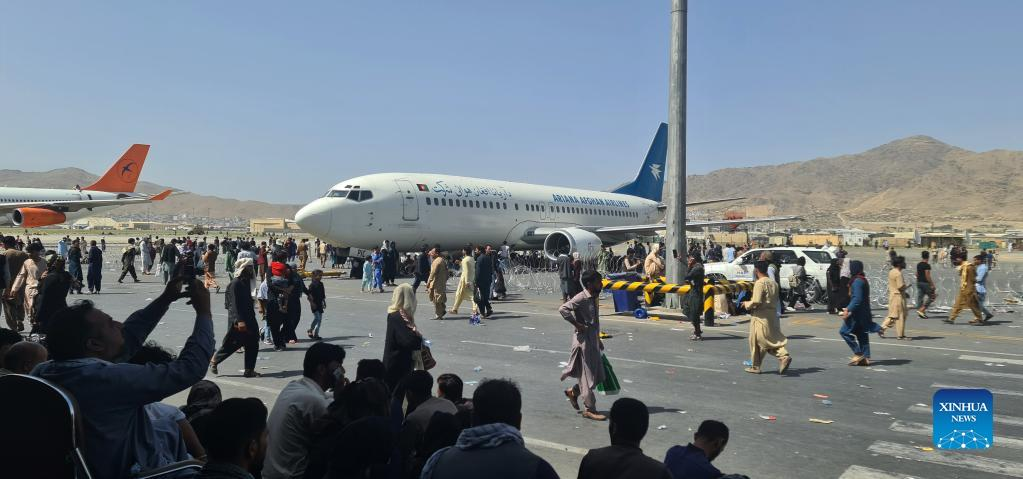
People gather at the Kabul airport during evacuation in Kabul, Afghanistan, Aug. 16, 2021, after the Taliban's takeover of Kabul on Aug. 15. Xinhua's top 10 world news events in 2021 U.S. withdrawal from Afghanistan a big fiasco, leaving disasters behind On Aug. 30, U.S. troops were completely pulled out of Afghanistan. The 20-year war Washington unilaterally launched ended in a big fiasco. The hasty withdrawal, regardless of U.S. allies, led to turmoil on Afghan soil. Meanwhile, brutal airstrikes brought many civilians, including children, to death. America once again demonstrated its selfish and high-handed nature. The longest war in U.S. history claimed more than 30,000 lives of Afghan civilians, and turned about 11 million people into refugees. Long-term wars and conflicts took a heavy toll on people's livelihood, as three-quarters of the population in Afghanistan lived below the poverty line. The U.S. forces fled irresponsibly, leaving behind them enduring pains and disasters for Afghans. (Xinhua)
China's head-of-state diplomacy promotes multilateralism
On Oct. 25, Chinese President Xi Jinping delivered an important address commemorating the restoration of the People's Republic of China's lawful seat at the United Nations 50 years ago, calling for joint efforts to practice true multilateralism and promote the lasting and peaceful development of the world.
This year marks the 100th anniversary of the founding of the Communist Party of China (CPC). Xi, also general secretary of the CPC Central Committee, has been engaged in intensive "cloud diplomacy" to open up new prospects for the party's diplomatic work. Under Xi's leadership, China has helped improve global governance, carried forward the shared human values and pushed for the building of a community with a shared future for mankind, which has been highly praised by the international community.
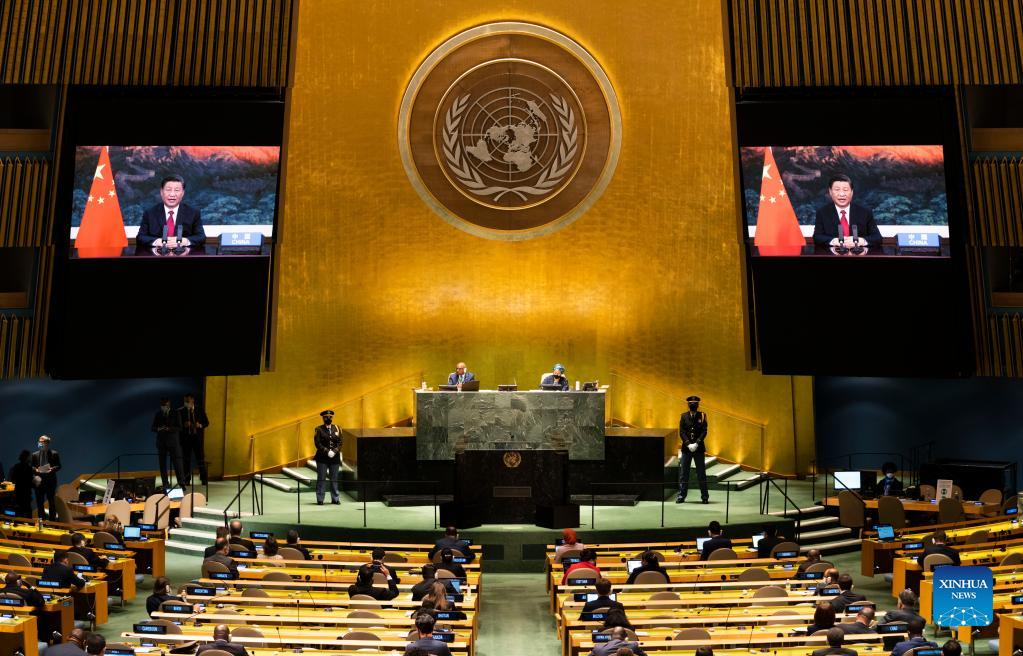
Chinese President Xi Jinping addresses the general debate of the 76th session of the United Nations General Assembly via video on Sept. 21, 2021. Xinhua's top 10 world news events in 2021 China's head-of-state diplomacy promotes multilateralism On Oct. 25, Chinese President Xi Jinping delivered an important address commemorating the restoration of the People's Republic of China's lawful seat at the United Nations 50 years ago, calling for joint efforts to practice true multilateralism and promote the lasting and peaceful development of the world. This year marks the 100th anniversary of the founding of the Communist Party of China (CPC). Xi, also general secretary of the CPC Central Committee, has been engaged in intensive "cloud diplomacy" to open up new prospects for the party's diplomatic work. Under Xi's leadership, China has helped improve global governance, carried forward the shared human values and pushed for the building of a community with a shared future for mankind, which has been highly praised by the international community. (Xinhua/Wang Ying)
Russia-West relations worsen again amid deep rifts
Moscow suspended the operation of the Russian Permanent Mission to the North Atlantic Treaty Organization (NATO) from Nov. 1 in retaliation against the alliance's expulsion of Russian diplomats.
Since the United States has long been sticking to the Cold War mentality and ganging up with its allies to press Moscow, Russia has clashed with Washington and some European countries over a series of issues, including Ukraine, cyber security and the so-called election intervention. The two sides reciprocally expelled diplomats several times.
Russian President Vladimir Putin and his U.S. counterpart, Joe Biden, so far met twice in 2021, but the two sides failed to improve bilateral ties significantly. The migration crisis on Belarus-Poland and Belarus-Lithuania border triggered another round of disputes between Russia and the West, and tensions between the two sides remained.
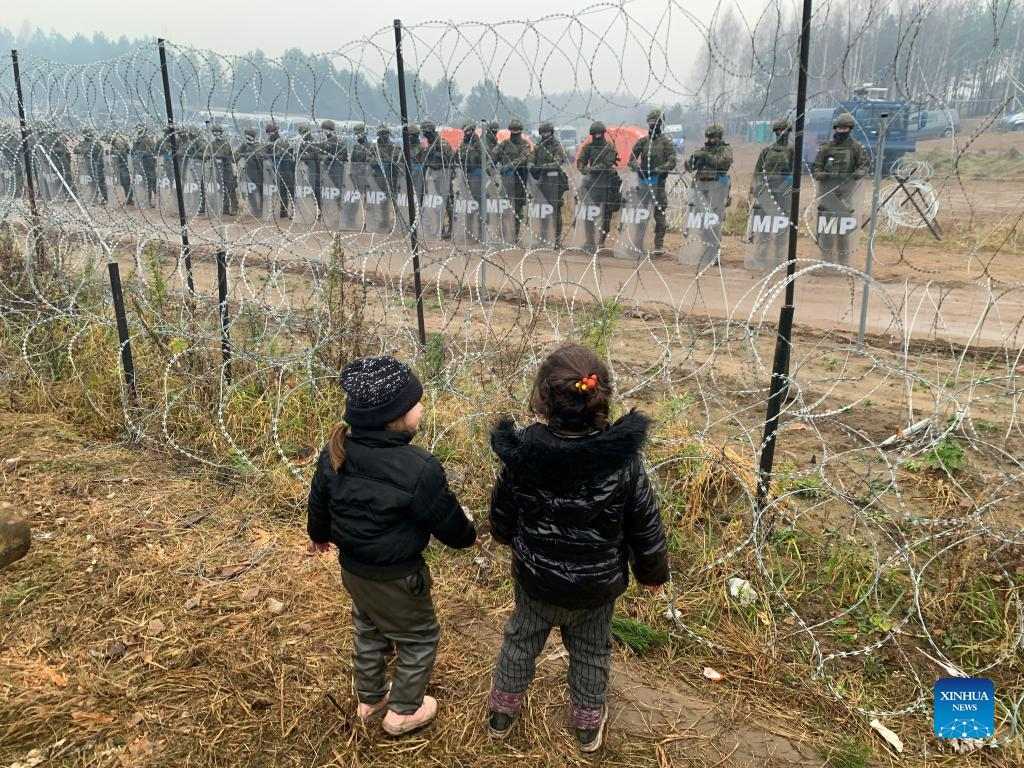
Children are seen at a refugee camp near the Belarusian-Polish border in Belarus, Nov. 14, 2021. Xinhua's top 10 world news events in 2021 Russia-West relations worsen again amid deep rifts Moscow suspended the operation of the Russian Permanent Mission to the North Atlantic Treaty Organization (NATO) from Nov. 1 in retaliation against the alliance's expulsion of Russian diplomats. Since the United States has long been sticking to the Cold War mentality and ganging up with its allies to press Moscow, Russia has clashed with Washington and some European countries over a series of issues, including Ukraine, cyber security and the so-called election intervention. The two sides reciprocally expelled diplomats several times. Russian President Vladimir Putin and his U.S. counterpart, Joe Biden, so far met twice in 2021, but the two sides failed to improve bilateral ties significantly. The migration crisis on Belarus-Poland and Belarus-Lithuania border triggered another round of disputes between Russia and the West, and tensions between the two sides remained. (Photo by Henadz Zhinkov/Xinhua)
COP26 in Glasgow ends with new climate pact
On Nov. 13, the 26th session of the Conference of the Parties (COP26) to the UN Framework Convention on Climate Change concluded in Glasgow, Britain, with a new global pact signed to tackle climate change, paving the way for a comprehensive and effective implementation of the Paris Agreement.
On the sidelines of the conference, China and the United States issued a joint declaration on enhancing climate action in the 2020s, injecting impetus into global collective actions.
Developed countries, which bear the historic responsibility for climate change, must take the lead in cutting emissions and fulfill commitments to increase financial support.
In 2021, winter storms across the United States caused blackouts in its energy-producing states. Heavy rainfalls inundated Asian cities. Devastating floods wreaked havoc in some European countries. Surging extreme weather events have sounded the "climate alarm," highlighting the need to take immediate joint actions against climate change.
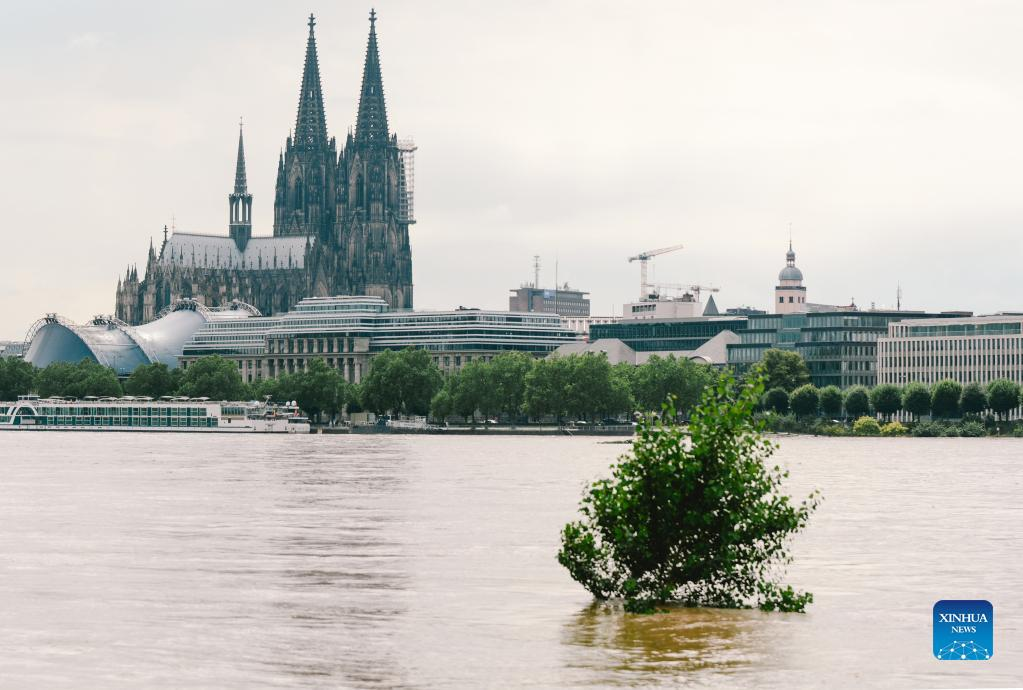
The bank of the river Rhine is flooded in Cologne, western Germany, on July 15, 2021. Xinhua's top 10 world news events in 2021 COP26 in Glasgow ends with new climate pact On Nov. 13, the 26th session of the Conference of the Parties (COP26) to the UN Framework Convention on Climate Change concluded in Glasgow, Britain, with a new global pact signed to tackle climate change, paving the way for a comprehensive and effective implementation of the Paris Agreement. On the sidelines of the conference, China and the United States issued a joint declaration on enhancing climate action in the 2020s, injecting impetus into global collective actions. Developed countries, which bear the historic responsibility for climate change, must take the lead in cutting emissions and fulfill commitments to increase financial support. In 2021, winter storms across the United States caused blackouts in its energy-producing states. Heavy rainfalls inundated Asian cities. Devastating floods wreaked havoc in some European countries. Surging extreme weather events have sounded the "climate alarm," highlighting the need to take immediate joint actions against climate change. (Photo by Tang Ying/Xinhua)
Chinese, U.S. heads of state hold first virtual meeting
On Nov. 16, Chinese President Xi Jinping and his U.S. counterpart, Joe Biden, held their first virtual meeting. The two heads of state had thorough and in-depth communication and exchanges on issues of strategic, overarching and fundamental importance to the development of China-U.S. relations and on important issues of mutual interest.
Since the beginning of this year, Xi also had two telephone conversations with Biden at the latter's request.
During the meeting via video link, Xi gave comprehensive exposition of China's principled position on China-U.S. relations, and clearly outlined a strategic framework of mutual respect, peaceful coexistence and win-win cooperation for China-U.S. relations, charting the course for the sound and steady growth of this relationship. The two leaders have reached principled consensuses on the importance of China-U.S. relations and rejection of a "new Cold War."
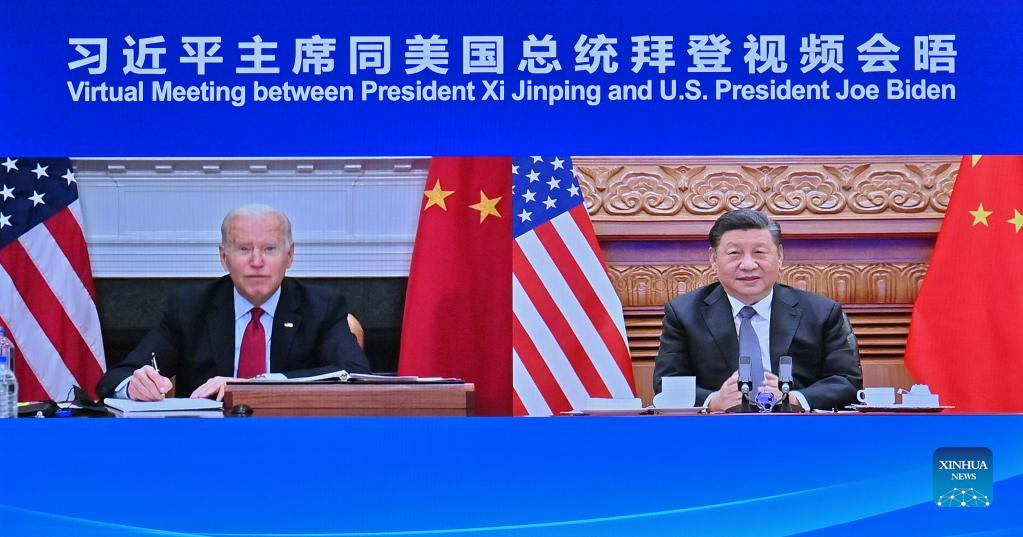
Chinese President Xi Jinping meets with U.S. President Joe Biden via video link, in Beijing, capital of China, Nov. 16, 2021. Xinhua's top 10 world news events in 2021 Chinese, U.S. heads of state hold first virtual meeting On Nov. 16, Chinese President Xi Jinping and his U.S. counterpart, Joe Biden, held their first virtual meeting. The two heads of state had thorough and in-depth communication and exchanges on issues of strategic, overarching and fundamental importance to the development of China-U.S. relations and on important issues of mutual interest. Since the beginning of this year, Xi also had two telephone conversations with Biden at the latter's request. During the meeting via video link, Xi gave comprehensive exposition of China's principled position on China-U.S. relations, and clearly outlined a strategic framework of mutual respect, peaceful coexistence and win-win cooperation for China-U.S. relations, charting the course for the sound and steady growth of this relationship. The two leaders have reached principled consensuses on the importance of China-U.S. relations and rejection of a "new Cold War." (Xinhua/Yue Yuewei)
Germany, EU face tests in post-Merkel era
On Dec. 8, Olaf Scholz was sworn in as Germany's new federal chancellor, taking the baton from his predecessor Angela Merkel who retired after 16 years in office. Germany and the European Union (EU) have entered the post-Merkel era.
Under Merkel's leadership, Germany achieved remarkable development, played a coordinative role in pushing the EU forward, and was engaged in friendly contacts and practical cooperation with China.
At the time of Merkel's departure, the EU is beleagured by mounting challenges -- ongoing COVID-19 resurgence, a tough economic recovery, the aftermath of Brexit and a sluggish European integration process.
On the road of pursing true strategic autonomy for the EU, Merkel's pragmatic and rational style of work is especially valuable.
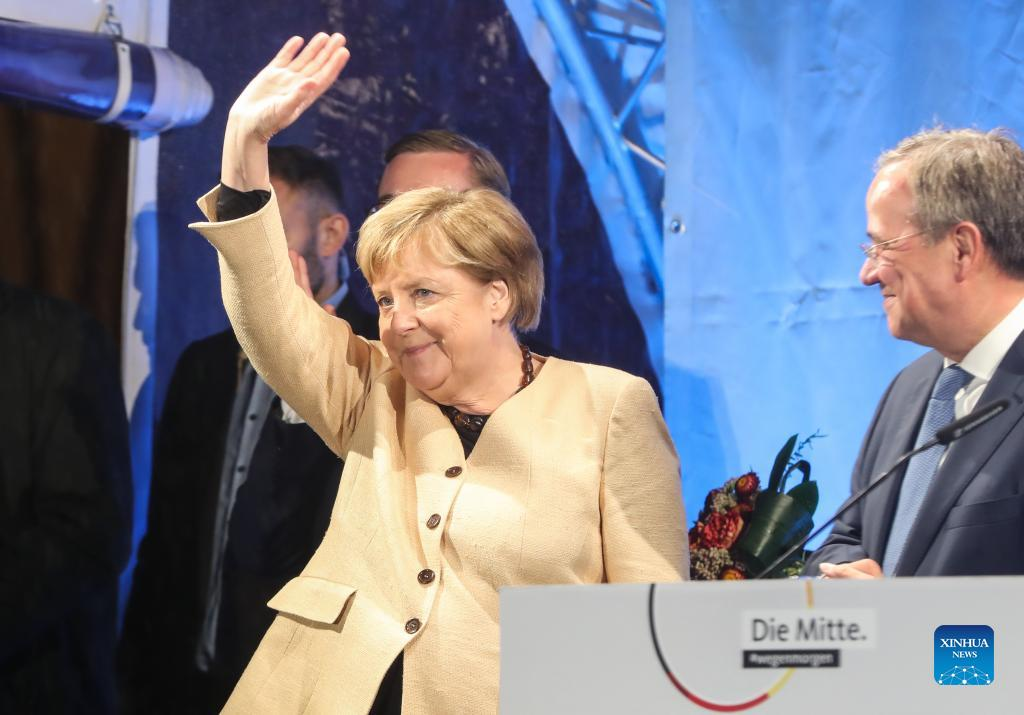
Angela Merkel greets supporters during an election rally of Christian Democratic Union (CDU) for Germany's federal elections in Stralsund, northern Germany, Sept. 21, 2021. Xinhua's top 10 world news events in 2021 Germany, EU face tests in post-Merkel era On Dec. 8, Olaf Scholz was sworn in as Germany's new federal chancellor, taking the baton from his predecessor Angela Merkel who retired after 16 years in office. Germany and the European Union (EU) have entered the post-Merkel era. Under Merkel's leadership, Germany achieved remarkable development, played a coordinative role in pushing the EU forward, and was engaged in friendly contacts and practical cooperation with China. At the time of Merkel's departure, the EU is beleagured by mounting challenges -- ongoing COVID-19 resurgence, a tough economic recovery, the aftermath of Brexit and a sluggish European integration process. On the road of pursing true strategic autonomy for the EU, Merkel's pragmatic and rational style of work is especially valuable. (Xinhua/Shan Yuqi)
Vaccination helps global fight against COVID-19
As of Dec. 29, according to the World Health Organization, 8.6 billion doses of COVID-19 vaccines were administrated worldwide. While the large-scale vaccination has helped the global anti-pandemic fight, there is an urgent need to eliminate the immunity gap.
While trying to overcome its own difficulties, China has provided a total of 2 billion doses of vaccines against COVID-19 for the world by the end of this year. Yet some Western countries have been busy stoking up "vaccine nationalism."
The virus has mutated at a frightening speed as variants including Delta and Omicron sprang up. The worldwide tally of confirmed cases has now exceeded 280 million and over 5.4 million people have been killed by the pandemic.
To win the protracted battle against COVID-19, there is a pressing need for all parties to work hand in hand to make vaccines a global public good and give full play to vaccines, medicines and preventive measures. Enditem
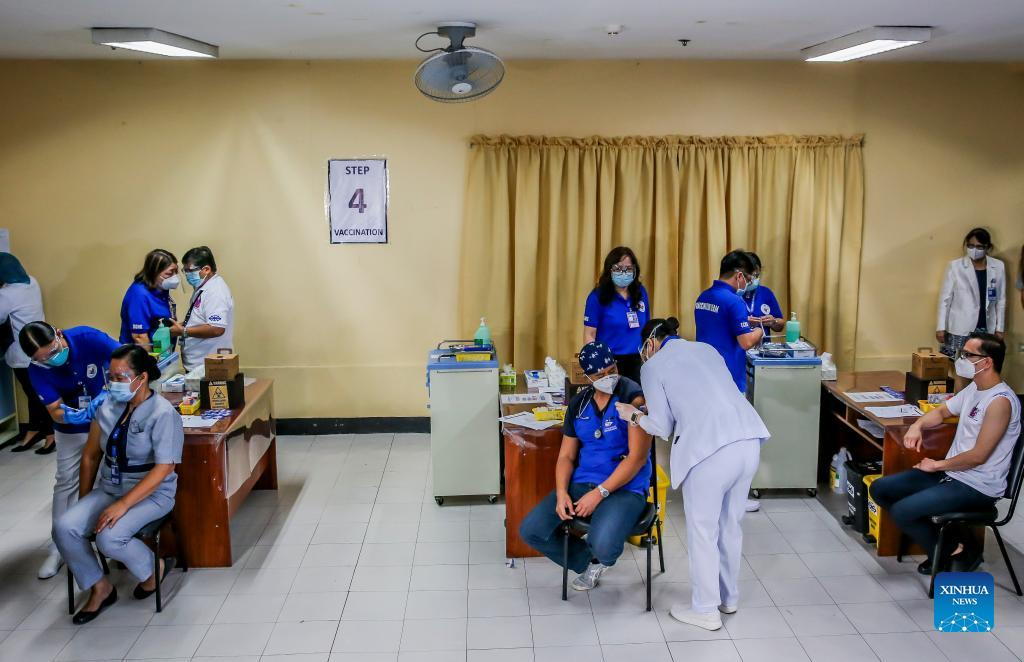
People receive China's Sinovac COVID-19 vaccines at the Lung Center of the Philippines in Manila, the Philippines on March 1, 2021. Xinhua's top 10 world news events in 2021 Vaccination helps global fight against COVID-19 As of Dec. 29, according to the World Health Organization, 8.6 billion doses of COVID-19 vaccines were administrated worldwide. While the large-scale vaccination has helped the global anti-pandemic fight, there is an urgent need to eliminate the immunity gap. While trying to overcome its own difficulties, China has provided a total of 2 billion doses of vaccines against COVID-19 for the world by the end of this year. Yet some Western countries have been busy stoking up "vaccine nationalism." The virus has mutated at a frightening speed as variants including Delta and Omicron sprang up. The worldwide tally of confirmed cases has now exceeded 280 million and over 5.4 million people have been killed by the pandemic. To win the protracted battle against COVID-19, there is a pressing need for all parties to work hand in hand to make vaccines a global public good and give full play to vaccines, medicines and preventive measures. (Xinhua/Rouelle Umali)




